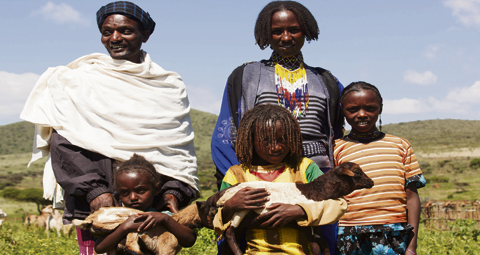BY Ian Dunn | March 4 | ![]() 0 COMMENTS
0 COMMENTS ![]() print
print

Would you break the law to feed your starving family?
IAN DUNN met the Saras, the family on the 2016 Lenten SCIAF Wee Box, when he was visiting Ethiopia and discovered how their lives were turned around by Scottish support
Would you break the law to feed your family? Carfi Sara did. As cattle herder in Southern Ethiopia, the terrible drought of 2011 killed all the cows and goats he had, leaving nothing to survive on.
“In my culture our wealth is our cattle,” he said. “That drought decimated them, killed them all. I lost everything. I became the poorest of the poor, there was nobody below me.”
When the drought came, he looked at his family (above)—his wife Kabale, daughters Loko, Dabo and son Gamachu, now 12, 4 and 8—and felt despair.
“I asked myself ‘Why did I marry, why have kids?’ as I could provide nothing,” he said. “As a man I have to bring something to the table but I had nothing. There were days when we had nothing to eat, more when we had just breakfast and then tea for the rest of the day.”
He took desperate measures.
“As a father and husband I have no choice but to support my family,” he said. “So I worked as day labourer, I begged from my kin. To feed my children I would steal from my parents.
“A living person always hopes hard times would pass, I hoped they would pass but I had no idea how that would happen.”
Finally, he resorted to sneaking into a forest that was a designated conservation area and chopping wood to sell as charcoal.
His own community turned on him.
“There is a term in our community called Jala—meaning a person loses his prestige,” he said. “He is ostracised and does not have the respect he enjoyed previously. That happened to me.”
He was caught cutting wood illegally and sentenced to five years in jail.
“Prison was very difficult,” he said. “You have no freedom to see your family, even to go to a funeral.”
A mother’s love
Carfi’s wife Kabale still had hungry children to feed and nowhere to turn when her husband was imprisoned. “When my husband was sent to prison I was left to fend for the family,” she said. “I also had to cut wood and sell it for charcoal.”
She too could have been caught and sent to jail at any time, leaving her children orphaned and alone, but she had what she calls ‘a stroke of luck.’
“The prison was located 100km away so, throughout his incarceration, I only visited him five times but then I was identified as a vulnerable individual and that is when the support came in,” she said, explaining how SCIAF helped her family. “I lost my husband but then the support came whereby I could change my life. I was even more lucky as the camel they gave me was pregnant so that came with milk.”
That milk sustained her family and, when Carfi returned from prison after serving three years, everything was different.
“They initially gave us one camel,” he said. “Now we have three. They gave me eight goats to start with. Now I have over 10.
“They gave me one donkey, now I have two and one is pregnant. The meat and milk I get not only sustains my family but I also sell it. Now we have meat to eat and I can support others as well. My life has massively changed for the better.“
And he credits this turn around to his wife.
“She is the foundation of this house,” he said. “When I was in prison she sold charcoal and firewood and then, when she got the support, she continued running the family in my absence. Since getting the support, I am a better father. I try to support my wife and kids and listen to them.”
A hand up
Carfi and his family are clearly on the up.
“All the people here want to know why foreigners are coming to see me,” he said laughing. “They think there must be something special about me. It is adding to my status!”
Yet, despite his good fortune, he feels his way of life may be unsustainable.
“There has always been droughts here, but now they come much more often,” he said. “There is less rain than before and the land is becoming a desert. This lack of rain means there is no grazing for our animals, they get thin and die.
“I feel the life of a pastoralist is coming to an end. With things going bad—with frequent droughts and low rainfall—it is hard to continue as our forefathers. Where we once had forest we now have desert and there are people who have moved on to the town. It is a growing sentiment and it is something everybody is pondering because we cannot continue with this way of life. It is not sustainable and it is open to risks.”
Fears across country
Across Ethiopia, many have the same fears as Carfi. The country is facing what some are calling its worst drought for 50 years. As many as 20 million people many need emergency food support this year according to Government estimates; crops have failed and the lack of water is putting livestock at risk.
Ethiopia is more prepared to deal with drought than in the past but international help is still needed.
That is something Scots can help with and Carfi has urged Scots to back to the Wee Box appeal.
“My message for Scotland is easy and short,” Carfi said. “I have changed my life because of you, but there are more families living in absolute poverty. I am just one man, by helping to change many lives, the whole community can be transformed. I have been helped and now I help others. When they ask me, I give to the poor, please do the same. Together, we can make people strong.”
— http://www.sciaf.org.uk/the-wee-box/










